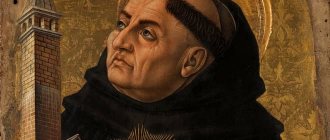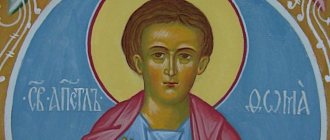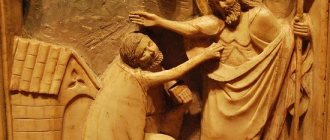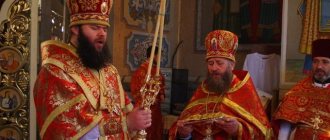How to combine faith and knowledge, the works of ancient thinkers and the provisions of the church fathers, religious dogmas and freedom of thought is a difficult question. During the Middle Ages, the scholastics, the scientists who created the science of debating, tried to find an answer to it. They were able to establish some connections. The philosophy of Thomas Aquinas became the highest level in the development of the scholastic school.
This Dominican monk, who went down in history as an outstanding Italian thinker and theologian, is today recognized as the most authoritative religious philosopher of the West and is revered by the church as a saint. Thomas successfully synthesized the ideas of Aristotelianism with Christian teaching and formulated the famous theological theses, known as proofs of the existence of God.
Thomas's childhood
There is a belief that before the birth of her son, Thomas’s mother met a holy hermit who predicted the boy’s spiritual path, entry into a monastic order, and achievement of great learning and holiness.
Origin and birth
Tommaso D'Aquino was born in 1225 or 1226 in the family castle of Roccasecca, which is located in the capital region of Lazio in Italy. His father was Landolf, a local aristocrat who came from the lower nobility, but through his service with the king was able to receive a knighthood. Theodora's mother came from the Neapolitan family of Caracciolo. Foma was the seventh and youngest child in the family.
Family
Landolf's sons were destined for a military career, and Thomas, as the youngest, was destined for the path of serving God, which was a common practice among the Italian nobility in those days. Sinibaldo, Thomas's paternal uncle, served as abbot of the Benedictine monastery at Montecassino, one of the largest and most famous in Catholic Europe. It was planned that the matured Tommaso would make a church career and receive the same position in the future. Therefore, already in early childhood, the boy was sent to be raised in a monastery of Benedictine monks, where he remained until he was 14 years old.
Teenage years and early life
Already in his youth, Thomas was distinguished by his curiosity, desire for science and knowledge. Scholarship attracted him more than a career in the church. This predetermined his future path of development as a thinker and theologian.
Getting an education
In 1239, the young man entered the University of Naples, where he studied the works of Aristotle, Averroes and Maimonides, as well as their influence on Christian theology. At the same time, he became close to the Dominican monks, whose order provided great opportunities for scientific work and teaching philosophy.
The future thinker enters the Faculty of Arts of the University of Paris, where he is warmly received by Albertus Magnus. This outstanding scholastic scientist takes the young man as his student. Soon Albert moved to Cologne, where he taught at the university.
Thomas follows his mentor, and after completing his studies he returns to Paris, and a few years later he himself becomes a teacher of theology. At the same time he wrote his first works.
Monastic tonsure
While still studying in Naples, the young man decides to take monastic vows and join the Dominican order, which his mother firmly opposed. Thomas tries to move to Paris, making a stop in Rome, but he fails to arrive in the capital of France, because on the way he is intercepted by his brothers, taken by force to his parents' house and kept locked up for 2 years.
However, the young man manages to free himself. He escapes to Rome, where he appears before the Master of the Dominican Order, Johann von Wildeshausen, and takes monastic vows.
Teaching in Rome
In 1260, Thomas returned to Italy, served as a priest in Naples and settled in the city of Orvieto in the Papal States. Here, already an experienced teacher, he lectures at the studium - a medieval university. For the Roman Curia he writes spiritual hymns, which are performed in Catholic churches to this day. The scientist becomes the papal adviser on theological issues.
At the same time, Aquinas continues to remain in the ranks of the Dominicans. A studium is created in Rome's Basilica of Santa Sabina, their main church, as the order's new educational project. At that time, educational courses in the Papal States did not yet have a clear division by specialization or subject.
A wide range of philosophical sciences, delimited from each other, devoted to both nature and higher matters, and moral and ethical issues, were taught at Santa Sabina. Foma was sent to work in the studio, where he continued to be actively involved in teaching. He also developed as a thinker: it was during this period that Aquinas began to work on the Summa Theologica, his main and most famous work.
Entry into the Dominican Order
During his studies, the young man became addicted to science. Despite the fact that the Dominicans were a small order, most of the monks were very educated people. In the Middle Ages, being an educated person was even dangerous; such people were accused of heresy and called servants of Satan.
The Benedictine Order, where Thomas’s parents wanted to place him, amazed him with its external greatness, but did not set as its goal the knowledge of the truth and its communication to ordinary people. Thomas considered such a life useless, so he ran away from home and joined the Dominican order.
The older brothers kidnapped Foma on the orders of his parents and brought him to the family estate, where the young man was locked up for 2 years before he managed to escape. During his imprisonment, they even sent harlots to him to seduce the monk, but he was unshakable. The parents wanted the young man to come to his senses and give up serving science, but they were unable to achieve what they wanted.
Mature age
The Dominican Order again sends Thomas to the University of Paris.
Here, in addition to teaching, he is actively involved in the problems of Averroism and Aristotelianism. In medieval theology there was a problem - how to adapt the ancient heritage to Christian doctrine. Aristotle's texts were available in translations by Arabic authors, notably Averroes. The task was to “cleanse” ancient Greek philosophy from Eastern influence and interpretations in order to preserve the dogmatic ideological purity of theology.
Thomas enters into controversy, sharply criticizes the Averroists and especially the university professor Siger of Brabant. The latter had great authority, but had extremely seditious views, even going so far as to deny the immortality of the human soul. Aquinas writes a treatise in which he denounces Siger and other Averroists.
End of teaching activity
In 1272, the scientist was recalled back to Italy - the Dominicans founded a university in Naples and needed the help of an experienced master and expert in science. Aquinas still continues to lecture, conduct church sermons, and is working on the third part of the Summa. However, deteriorating health soon forced him to leave the department and writing.
last years of life
In the fall of 1273, the scientist experienced a mystical experience, which became one of the most mysterious facts of his biography. One day, when Thomas was in a state of ecstasy, visions were revealed to him, after which he finally stopped his work. As a result, “Sums” remained unfinished.
He had very little time to live. However, soon Pope Gregory X demanded that the scientist appear at a church council in Lyon, where an attempt to reconcile the Catholic and Orthodox churches after the schism of 1054 was planned.
It was expected that a wise and experienced thinker would be able to show the way to the eventual resolution of differences. Aquinas sets out on a journey that runs through the places where he spent his childhood. Thomas stays in the monastery of Fossanuova (near Rome), where he dies in 1274. Now his remains rest in the temple of Toulouse (France).
Historical and philosophical origins
The scientist's philosophical views are closely related to the ideas of Aristotle and his logic. You can conduct a comparative analysis and see how the ideas of Thomas Aquinas actually compare with ancient philosophy.
He not only studied in detail the heritage of the ancient Greek thinker, but also rethought it and creatively adapted it to Christian theology. The influence of Arab and ancient commentators and representatives of Neoplatonism is noticeable in the works. Among them are Cicero, Avicenna, John of Damascus, Averroes, Maimonides and some others.
What influenced the formation of the scientist’s worldview
A distinctive feature of the Dominican Order already at an early stage of history was active educational activities. During the 13th century, learned monks created their own educational institutions and headed theological departments in a number of European universities. This vigorous activity occurred during Aquinas’s life and largely influenced his passion for knowledge - for many years the Dominicans were teachers and mentors.
Among them was Albert the Great, one of the most prominent theologians and scholastics. In the process of cognition, he paid special attention to the development of memory, which in his concept was seen as part of prudence - one of the important virtues. All this was reflected in the mnemonic rules formulated already in the works of Aquinas.
Albert actually discovered Aristotle for the scientific world of Europe, having studied in detail almost all of his surviving legacy. The works of this ancient philosopher had a strong influence on the basic ideas of Thomas, who interpreted them in a Christian scholastic manner. Thus, the doctrine of truths received further development, and the laws of formal logic of Aristotelianism became the starting point for deducing the famous proofs of the existence of God.
About the school nickname
Thomas Aquinas was distinguished by his tall stature, bulkiness and clumsiness. It is also believed that he was characterized by meekness, excessive even for monastic humility. During discussions with his mentor, the theologian and Dominican Albertus Magnus, Thomas spoke rarely, and other students laughed at him, calling him the Bull of Sicily (even though he was from Naples, not Sicily). Albertus Magnus is credited with a prophetic remark, allegedly uttered to pacify the students who were teasing Thomas: “Do you call him a bull? I tell you, this bull will roar so loudly that his roar will deafen the world.”
Posthumously, Aquinas was awarded many other, more flattering nicknames: he is called the "angelic mentor", "universal mentor" and "prince of philosophers".
Ideas of the philosophy of Thomas Aquinas
The systematizer of Aristotelian logic went further. In his texts, Aquinas was able to combine ancient pagan wisdom with Christian values. At the same time, the scientist speaks not only about lofty matters and supernatural things. A significant place in his work is occupied by anthropology, moral and ethical issues and politics in the context of the public good.
Connection with philosophy
In the Middle Ages, philosophy was closely intertwined with theology and, in essence, was part of the latter. Aquinas identifies philosophical science, which studies the “truths of reason,” as a separate discipline. In his opinion, it is in a somewhat subordinate position relative to theology, dedicated to the “truths of revelation,” which, according to the scientist, make it possible to join divine knowledge.
Aristotle's concept of truth speaks of its four successive levels:
- experience;
- art;
- knowledge;
- wisdom.
Aquinas radically revises this scheme and conceptualizes wisdom as a separate, independent level, and he calls its source revelation from above.
At the same time, wisdom itself is also divided into three hierarchical levels:
- Graceful - bestowed from above.
- Theological - coming from faith armed with reason.
- Metaphysical - generated by the mind that comprehends the world of existence.
The capabilities of the mind are limited; with its help one can comprehend the reality of God and the essence of monotheism, but the dogma of the Trinity and the idea of resurrection are already beyond this framework. Therefore, Aquinas divides theology into rational, based on human reason, and supernatural, based on personal mystical experience and divine revelation.
Science and faith are not opposed, but complement each other. Reason contributes to the knowledge of God, and philosophy helps in the presentation of theological positions.
About being
The scientist adhered to the concept of being as the highest form of act and perfection, which is present in everything that exists, revealing its true depth and reality. The existence of an object is more important than its essence; it is possible only thanks to the divine act of creation. The world is presented as a multitude of phenomena and objects that owe their existence to a higher will. Only God combines being and essence as inseparable concepts.
According to Aquinas, only God has true existential nature, and everything else, being his creation, forms a certain hierarchy of being. The higher and more complex the subjects created by God are, the more complex their nature, the more perfect their existential component and the more freedom in manifestation.
About matter and form
According to Aquinas, form is primary, for it is it that gives things and phenomena a generic and specific identity. Following the logic of Aristotelianism, the thinker also saw matter as a secondary, initially passive substrate. But it also has value, because the essence of everything physical is manifested in the unity of matter and form.
Angels, as spiritual beings, are more complex - they are devoid of a physical principle and are outside the material world. The nature of man is dual, for it combines both form and matter, but at the same time it has an essence endowed by God. Corporeal beings manifest themselves through materiality, limited to one degree or another.
About man and his soul
The human race is defined as the middle link between angels and all other living creatures. Humans are the only corporeal, intelligent beings who are endowed with free will and the desire to understand the world around them. Unlike the angels, whose essence is flawless and incorporeal, man is imperfect and capable of actions directed against the will and plan of God.
At the same time, people are endowed with a soul given from above. After the death of the physical body, she appears before her Creator, the righteous are united with God, receiving eternal bliss, and hellish torment awaits sinners. The soul is the life force of a person, it is immortal, self-sufficient and at the same time invisible.
Aquinas, in his teaching about man, follows the Christian postulate of free will - people have the right to choose between sin and virtue. Developed intellect is more conducive to choosing the latter and controlling base animal desires that damage the soul.
About knowledge
The basis of the cognitive process is considered to be sensory experience generated by interaction with the outside world. In this case, objects and phenomena can be perceived by the senses only partially. The next stage is perception by the soul through external senses, when the cognizable loses its material form and acquires a so-called appearance or cognizable image. Next, the images are comprehended or processed by internal feelings, which have their own classification.
Types of sensory perception:
- Passive memory - stores information that has already been collected.
- Active memory - includes in the mind what was previously collected.
- General feeling - collects sensations from the outside.
- Intelligence - accumulates sensory images (passive), transforms and separately comprehends them, forming concepts (active).
Cognition can be of three types.
A person perceives what is happening around him through:
- mind - responsible for the spiritual components of a person;
- intelligence - helps to understand the world;
- reason - gives the ability to reason, compare and generalize.
About ethics
According to Thomas Aquinas, the first cause of all things is God. Contemplation of a higher power and unity with it after the death of the body is the ultimate goal of human existence, and good deeds contribute to its achievement. Deviation from this direction is evil, which is not opposed to good, but is rather understood as the insufficiency of good or its deprivation.
A person who has a God-given soul and free will receives from above a natural moral law, which helps to recognize the truth on the path to achieving bliss, encourages him to do good and distinguish it from evil.
About politics and law
In his doctrine of social order, Aquinas proceeds from the moral essence of man - it is precisely this that is the source of law. Law, on the other hand, is defined as the general law that is used to guide one to perform or refrain from doing an action.
Developing the Aristotelian concept of natural (natural and obvious) and written laws, the thinker complements them by dividing them into human ones, which determine the life of society, and divine ones, leading to the achievement of bliss in heaven. The source of divine law is the Bible, the main provisions are revealed to people through revelation and captured in writing.
However, Aquinas does not consider theocracy to be an ideal social system. To achieve the highest goal, the best is considered to be a balanced ratio of secular and church power with the primacy of the latter. Ideally, the Pope is seen as the ruler of the world, but the spheres of influence of church and state are significantly separated.
At the same time, secular power contains three elements:
- The essence is a hierarchical vertical in society.
- Form or origin - type of government.
- Use - ways of exercising power.
The hierarchical structure of power and the subordination of the people to the ruler is the order established by God. However, people, using the powers of power, can go against virtue when they neglect moral standards through the oppression of the people, various abuses and neglect of the public good.
The thinker identifies two main forms of power. Monarchy, aristocracy and city government are fair, and tyranny, oligarchy and democracy are unjust. The criterion for division is the ability of the system to serve the public good, while evil that has multiple sources is seen as lesser. Moreover, the practical benefits of such a system for a particular society are more important than the choice of a personal or collective form of government. Monarchy is generally named the best option, and tyranny the worst.
About the social system
Following Aristotle, who developed these issues in Politics, Thomas Aquinas reflected on the nature and character of the ruler’s sole power. He compared royal power with other forms of government and, in accordance with the traditions of Christian political thought, spoke unequivocally in favor of the monarchy. From his point of view, monarchy is the fairest form of government, certainly superior to aristocracy (the power of the best) and polity (the power of the majority in the interests of the common good).
Thomas considered the most reliable type of monarchy to be elective, not hereditary, since electivity can prevent the ruler from turning into a tyrant. The theologian believed that a certain number of people (he probably meant bishops and part of the secular nobility participating in the election of secular sovereigns, primarily the Holy Roman Emperor and the Pope) should have the legal opportunity not only to give the king power over themselves, but and deprive him of this power if it begins to acquire the characteristics of tyranny. In Aquinas's view, this "multitude" should have the right to deprive the ruler of power, even if they had "previously subjected themselves to him forever," because the bad ruler "exceeds the bounds" of his office, thereby violating the terms of the original contract. This thought of Thomas Aquinas subsequently formed the basis of the concept of “social contract”, very significant in modern times.
Another way to combat tyranny, which Aquinas proposed, makes it possible to understand which side he was on in the conflict between the empire and the papacy: against the excesses of a tyrant, he believed, the intervention of someone higher than this ruler could help - which could easily be interpreted contemporaries as an approval of the pope's intervention in the affairs of “bad” secular rulers.
Evidence for the Existence of God
Synthesizing ancient and contemporary scholastic philosophical thought, Aquinas derives theses that prove the reality of God as a phenomenon. This evidence is one of the most important parts of the thinker’s legacy.
Through movement
The world is understood as a universal movement, while any thing can move only by receiving an impulse from the outside. A kind of chain is formed from many links. However, it cannot be infinite - there is a first link that ultimately creates dynamics for all things. This is what God is.
Through necessity
There are things both random and natural. Any phenomenon can exist in potential and manifest itself through existence. However, with the mere potentiality of things, the world simply would not have arisen physically; something is needed that can transform the potential into the real and existential, that is, the highest divine power.
Through the productive cause
The thesis in its essence is very similar to the first proof. Every thing or phenomenon is defined as a consequence of a certain cause. Thus, flowers grow from seeds, living beings are born from each other, and a thundercloud brings rain. But nothing can create itself - there is an endless series of cause-and-effect relationships that must have a starting point. This is God.
Through the target cause
The postulate comes from the idea of the universe or the government of things. That is, everything that exists has a direction and a vector of movement in its existence. Only thinking living beings can control themselves to one degree or another, but objects are deprived of this possibility, since they do not have a mind. Therefore, God is the primary source of goal-setting, who has absolute dominion over all things and can direct them according to his will.
From degrees of being
Everything that exists is understood as a multitude of things with varying degrees of completeness and perfection. Therefore, based on the logic of comparison, there must be something that has absolute perfection. That is exactly what God is.
About indulgences
Thomas Aquinas resolved a number of doubts associated with the practice of granting (and purchasing) indulgences. He shared the concept of the “treasury of the church” - a kind of “excessive” supply of virtues, replenished by Jesus Christ, the Virgin Mary and the saints, from which other Christians can draw. The Pope can dispose of this “treasury” by issuing special acts that are legal in nature—indulgences. Indulgences work only because the holiness of some members of the Christian community outweighs the sinfulness of others.
Reception of Thomism
After Aquinas's death, his doctrine called Thomism experienced sharp criticism for some time and was even officially condemned. But it soon became predominant among members of the Dominican Order, and then the leading direction in Catholic thought.
For obvious reasons, Paris and Naples became the centers of Thomism, where the founder of the movement lived and worked for many years. The teaching was actively developing, becoming already in the 15th century the main form for scholastic science. It is influenced by the Renaissance, as a result of which Renaissance-modernist and conservative movements are distinguished.
In the middle of the 19th century, neo-Thomism emerged - an attempt to adapt the teachings of Aquinas to new times, when discoveries were made in the field of natural science. Ideas are borrowed from the works of Kant, Hegel and other philosophers.
Thomism becomes the standard of Catholic theology, a compulsory subject in seminaries and part of university courses in theology. It dominated the official creed of Rome until the Second Vatican Council in 1962–1965.
Proceedings
The first collected works of Thomas were published back in 1570. In total, he wrote more than 80 works, including “Summas”, discussions on various issues, commentaries, small-format essays, treatises on alchemy and poetry.
Summa Theologica (1265-73)
The main work of Thomas and one of the classic works of European medieval theology. Begun in 1265 and consisting of three large parts, it remained unfinished due to the death of the author.
The book became widely known due to the evidence it contained for the existence of God. On its pages there are many quotes from the works of Aristotle, Augustine and many other philosophers. This fundamental treatise brought together almost all the theological issues of its time.
Summa Philosophy ("Summa against the Pagans", 1261-63)
Written in the summa genre, the work is largely addressed to missionaries for preaching, and is in the spirit of apologetics for possible polemics with non-believers. One of the main ideas is the possibility of saving the soul of every person. The path to eternal life is the pursuit of good, and the tool is the comprehension of divine truth, which must be carried by the missionary.
The treatise consists of 4 books outlining the Christian understanding of monotheism, divine providence, the creation of the world and the dogmas of faith.
On the reign of sovereigns (1267)
A famous political treatise, based on the ideas of Aristotelianism, about man as a social being. The main idea of the work is that the emergence of the state and power, as tools for creating the common good, occurs naturally.
It is also consistent with Christian doctrine. At the same time, the right of people to revolt and overthrow a ruler who has violated justice and the natural law given from above is stipulated.
On the unity of reason against the Averroists (1270)
A lesser-known, but very interesting work, where the author defends the correct, in his opinion, interpretation of Aristotle’s ideas in a Christian context. Averroism is seen as a distorted interpretation of ancient teaching, spoiled by Arab influence and contrary to the teachings of the church.









